Simone Weil and Continental Philosophy
Reframing Continental Philosophy of Religion
Series editors: Steven Shakespeare, Senior Lecturer in Philosophy, Liverpool Hope University
Duane Williams, Senior Lecturer, Liverpool Hope University
Reframing Continental Philosophy of Religion aims to revitalize continental philosophy of religion. It challenges the standard Western Christian framework which has dominated philosophy of religion in the academy. It provides a platform for voices, theories, and traditions which have been suppressed or marginalized by that framework and offers genuinely new and constructive openings in the field. It is motivated by an imperative to liberate original thinking about religion from the legacy of Empire.
The series is experimental, creative, subversive, and risky. It promotes work which brings continental philosophy of religion into fruitful dialogue with postcolonial theory; Islamic studies; heretical, esoteric, or mystical, or otherwise marginalized Western traditions; non-Western philosophical traditions; and critical studies of power, race, gender, and sexuality. Taking seriously the fertility of European philosophy, it does not, however, merely subject other discourses to a European gaze, but allows different discourses to interact and mutate one another on a mutual basis.
Reframing continental Philosophy of Religion will not leave continental philosophy of religion as it finds it.
The series is published in partnership with the Association for continental Philosophy of Religion at Liverpool Hope University.
Titles in the series:
Speculation, Heresy, and Gnosis in Contemporary Philosophy of Religion: The Enigmatic Absolute
edited by Joshua Ramey and Matthew S. Haar Farris
Simone Weil and Continental Philosophy
edited by A. Rebecca Rozelle-Stone
Published by Rowman & Littlefield International Ltd
Unit A, Whitacre Mews, 2634 Stannary Street, London SE11 4AB
www.rowmaninternational.com
Rowman & Littlefield International Ltd. is an affiliate of Rowman & Littlefield
4501 Forbes Boulevard, Suite 200, Lanham, Maryland 20706, USA
With additional offices in Boulder, New York, Toronto (Canada), and Plymouth (UK)
www.rowman.com
Selection and editorial matter 2017 A. Rebecca Rozelle-Stone
Copyright in individual chapters is held by the respective chapter authors.
All rights reserved. No part of this book may be reproduced in any form or by any electronic or mechanical means, including information storage and retrieval systems, without written permission from the publisher, except by a reviewer who may quote passages in a review.
British Library Cataloguing in Publication Data
A catalogue record for this book is available from the British Library
ISBN: HB 978-1-7866-0131-5
Library of Congress Cataloging-in-Publication Data
Names: Rozelle-Stone, A. Rebecca (Adrian Rebecca), 1978 editor.
Title: Simone Weil and continental philosophy / edited by A. Rebecca Rozelle-Stone.
Description: Lanham : Rowman & Littlefield International, 2017. | Series: Reframing Continental philosophy of religion | Includes bibliographical references and index.
Identifiers: LCCN 2017040651 (print) | LCCN 2017041587 (ebook) | ISBN 9781786601339 (Electronic) | ISBN 9781786601315 (cloth : alk. paper) |
Subjects: LCSH: Weil, Simone, 19091943. | Continental philosophy.
Classification: LCC B2430.W474 (ebook) | LCC B2430.W474 S545 2017 (print) | DDC 194dc23
LC record available at https://lccn.loc.gov/2017040651
 The paper used in this publication meets the minimum requirements of American National Standard for Information SciencesPermanence of Paper for Printed Library Materials, ANSI/NISO Z39.481992.
The paper used in this publication meets the minimum requirements of American National Standard for Information SciencesPermanence of Paper for Printed Library Materials, ANSI/NISO Z39.481992.
Printed in the United States of America
For my former philosophy students
and ongoing interlocutors,
Jackie Berg, Madison Berns, Ben Davis, Caleb Faul,
Carlie Hughes, Ekram Kofiah, Nate Lavoie,
and Gary Suchor
Introduction
Attending to the Outlaw
A. Rebecca Rozelle-Stone
This is a book that was conceived and developed from a perceptible gap. The gap is conceptual and discursive, but it is also pragmatic and experiential, insofar as discursive omissions reinforce the apparent solidity of established ways of thinking and being, rendering other practices outlaw. To put it simply, scholarship in the English-speaking world on the philosopher, mystic, and social activist Simone Weil has tended to focus on her evident and well-established influences from the ancient and modern philosophic traditions as well as on her many religious inspirations. However, she is often not included in the discourses or engaged with the theorists of the contemporary continental philosophical tradition, the roots of which were becoming well established in the time and place of her early twentieth-century French life (19091943). For this reason, the relative gap Yet her self-imposed exile was not so much based on certain philosophical principles and disagreements but rather due to her different ways of being in the world and the manner of her attention therein.
For instance, there is the well-known encounter Weil had with Simone de Beauvoir, the latter having recounted their brief meeting at the Sorbonne in Memoirs of a Dutiful Daughter. Beauvoir writes:
A great famine had broken out in China, and I was told that when [Weil] heard the news she had wept: these tears compelled my respect much more than her gifts as a philosopher. I envied her for having a heart that could beat right across the world. I managed to get near her one day. I dont know how the conversation got started; she declared in no uncertain tones that only one thing mattered in the world today: the Revolution that would feed all the starving people on the earth. I retorted, no less peremptorily, that the problem was not to make men happy, but to find the reason for their existence. She looked me up and down: Its easy to see that youve never gone hungry, she snapped. Our relationship did not go any further.
Beauvoir might have been correct to take Weils response as a personal attack on someone assumed to be a high-minded little bourgeoise, but the judgment also reveals Weils early dismissal (rightly or wrongly) of attending to existential concern in the face of material deprivation. As Eric O. Springsted remarks, We learn to read [the world] in a certain way because of the way that we live. It would not be a stretch to assume that Weils decreated mode of life alienated her from most of her contemporaries.
She had a few other brushes with well-known continental figures. Weil counted Jules Lagneau and his famous student (her teacher), mile Chartier (Alain), along with Edmund Husserl, among the few contemporary philosophers that she deemed to have genuine, eternal philosophy, not susceptible of progress. This phenomenological principle she found to be at the heart of philosophy at its best, that is, philosophy that is about transformation facilitated by detached suspension of personal interests and prejudices, rather than system-building, position elaboration, and knowledge acquisition.
Prior to this encounter with Berger/Husserl, in 1933, she met Georges Bataille at the Cercle communiste dmocratique, presided over by Boris Souvarine. The two also worked together as contributors to the journal La Critique sociale. Bataille had invited her to become a member of the Cercle, which Weil declined, even going so far as to advise that it be dissolved, given the problems with collectivities in the face of real problems, as she saw it.

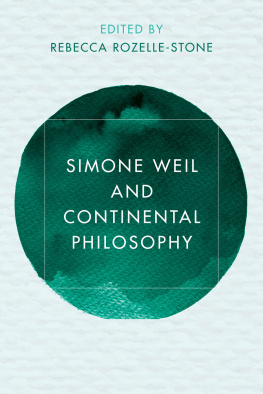
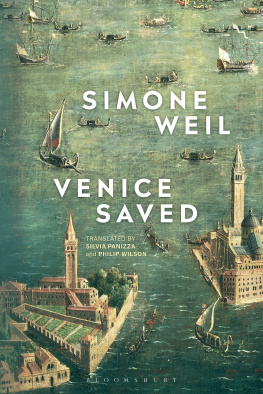
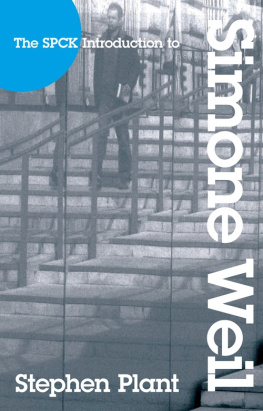
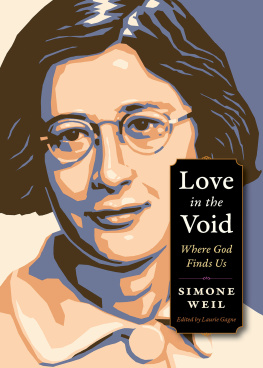
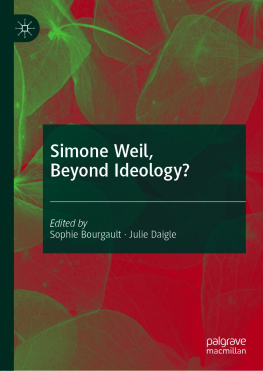
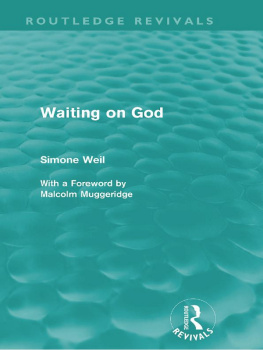
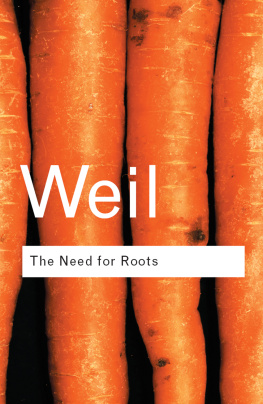
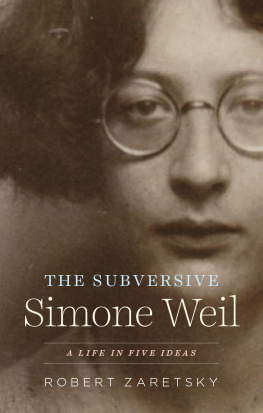
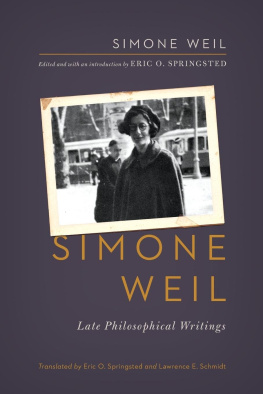
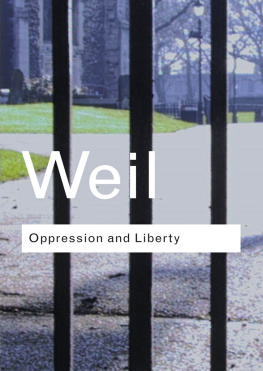
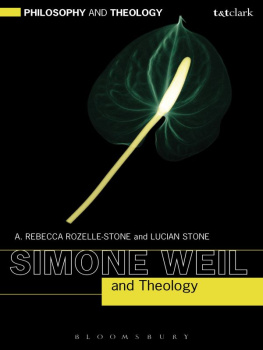
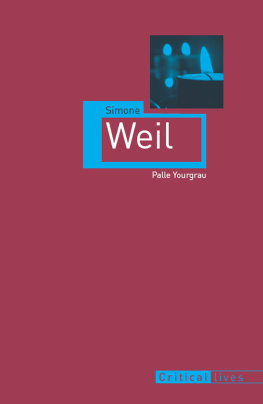
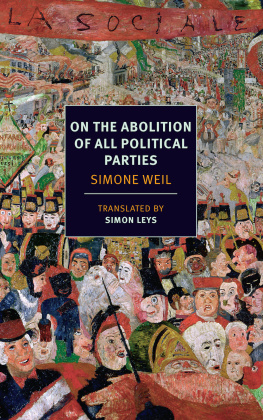

 The paper used in this publication meets the minimum requirements of American National Standard for Information SciencesPermanence of Paper for Printed Library Materials, ANSI/NISO Z39.481992.
The paper used in this publication meets the minimum requirements of American National Standard for Information SciencesPermanence of Paper for Printed Library Materials, ANSI/NISO Z39.481992.